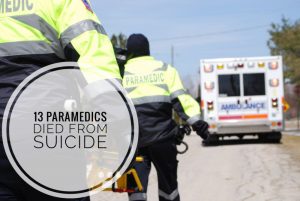During summer season, Marie-Julie Cosenzo used to spend most of her days biking, running or playing at the park with her children. Since 2015, even a simple task like getting dressed is a burden for this mother of two.
Cosenzo who lives in Ottawa and practiced as a paramedic with the Coopérative des Paramédics de l’Outaouais for about 10 years was diagnosed with post-traumatic stress disorder (PTSD) in October 2015, after responding to a traumatic call.

It was a dark and cold October night in Gatineau when Cosenzo and her partner got called to a scene where they found a 17 years-old boy died by suicide.
“I even remember the song that was playing in the ambulance when we got the call,” she says. “I had seen gruesome scenes before, but that one really affected me.”
Cosenzo is one of thousands of paramedics who are living with PTSD in Canada.
According to the Tema Conter Memorial Trust, a foundation that advocates better mental-health support for emergency service workers, more than 25 per cent of paramedics in Canada will be diagnosed with PTSD at some point in their careers, compared to 7 per cent of police officers.
Post-traumatic stress disorder is a mental illness. It often involves exposure to trauma from single events that involve death or the threat of death or serious injury, according to the Canadian Mental Health Association.
Cosenzo says there is still a lot of stigma around PTSD in the paramedics’ world, which could result in the number of diagnosis being lower than the number of people living with PTSD.
We often see ourselves as heroes, but in the end we are just like everyone else. Marie-Julie Cosenzo
Not only are paramedics more likely to develop this mental illness than other first responders, they are also most likely to die from suicide.

Since the beginning of 2017, 13 paramedics in Canada died from suicide, which were reportedly linked to their careers, compared to five police officers, according to the Tema Conter Memorial Trust.
Daily burden
Paramedics are subjected to traumatic experiences on a daily basis, sometimes more than once a day.
“The calls volume is always so high that there are no downtime and the level of stress keeps building up,” says Natalie Harris, a paramedic who worked with the County of Simcoe Paramedic Services for 12 years.
The demons of PTSD reached Harris after she entered a hotel room where two nearly decapitated women lay dead, and she had to care for their murderer who was suffering from self-inflicted knife wounds.
“I did not know what I would walk into and when I got there, the scene was so gruesome and I had no idea how to process it.”
Right after unloading the man at the hospital, her and her partner left for another call.
Both women say they have tried to suicide in the past couple of years.
Family
PTSD affects both the person’s mental and physical health, ultimately affecting their loved ones.
“I feel like a boring mother,” says Cosenzo. “I can never go play at the park with my six year old son because I’m too scared to have a panic attack,” she adds.
As for Harris, she said her relationship fell apart once the effects of PTSD kicked in. She said she could not sleep well, would drink and has overdosed on drugs. “I had a plan to kill myself.”
Both women say the help given to paramedics once they have been diagnosed with PTSD is getting better, but there is still a lot of work to do.
